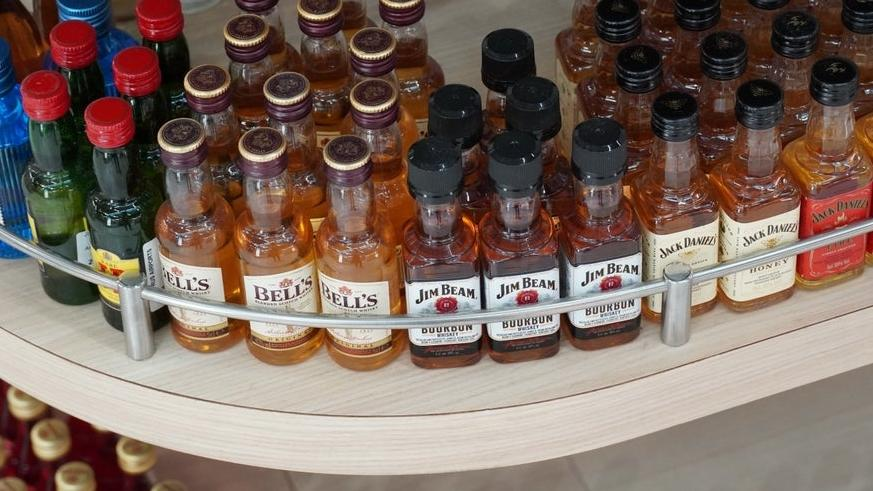Tiny Liquor Bottles Spark Huge Debate
Boston is mulling a ban on miniature bottles of alcohol—for more reasons than you might think.
Minis, shooters, nips—whatever you call those itty-bitty bottles of booze sold at the register in liquor stores, some folks will only ever refer to them as a public nuisance. One such detractor is Ricardo Arroyo, a city councilor in Boston, who has proposed a citywide ban on liquor stores selling the product. It turns out there are many compelling reasons to ban these little bottles, but liquor store owners are raising the alarm about potential drawbacks.
The Associated Press reports that Arroyo spoke at a city hall hearing in favor of the ban earlier this month, citing multiple reasons that so-called nips are harmful and should be outlawed. The arguments against the product include:
- Alcohol abuse: The $0.99 price point of these small bottles, and the fact that they're usually right at the front register, lowers the barrier to entry, allowing for easier access to hard liquor.
- Drinking and driving: Arroyo notes that tiny bottles are ideal for drivers who want to drink without getting caught. Not only are the little bottles easy to slip into a pocket if a driver gets pulled over, but the bottles can also be covertly tossed out the window. Which leads to the next point...
- Litter: These one-and-done bottles are practically designed to be flicked away like a cigarette butt once they're emptied, leading to tons of excess litter in urban areas.
- Environmental factors: Even if consumers responsibly disposed of all these little bottles in the proper receptacle, nips aren't recyclable, so they generate a lot of trash.
- Teen drinking: Arroyo said that parents of teens have told him the small booze bottles are the easiest to hide and are thus favored by underage drinkers.
- Lost profits: In Chelsea, a city outside Boston, liquor store owners allege that after the city banned nips in 2018, their stores saw collective losses of $6 million in sales. They also claim that in the wake of the Chelsea ban, adjacent communities saw higher liquor sales, indicating that consumers were simply buying the same amount of shooters but spending that money outside the community.
- Litter can be creatively addressed: No one is claiming the bottles don't generate tons of litter—they do—but opponents of a ban recommend that the government instate a deposit system to aid cleanup efforts, just as the aluminum can deposit incentivizes citizens to remove cans from the streets.
- Volume purchases = volume drinking: The thinking goes that if consumers are unable to buy a 2-oz. bottle of booze, they'll buy a bigger bottle of booze instead, so banning minis doesn't reduce alcohol abuse. (To my mind, this point is technically plausible but unlikely in practice—price tags can and do affect purchasing decisions, and paying $20 versus $0.99 is a barrier that will likely deter many consumers.)
The decision of whether to ban the sale of nips in Boston belongs to a licensing board that oversees the city's liquor stores. The board says it already asks stores to voluntarily agree not to sell nips, but that's neither a law nor a regulation.
For their part, the city's liquor store owners and other opponents of the proposal have come up with some counter-arguments—which makes sense, given that one shop owner told the AP that minis, with their high profit margin, account for 15% of his total sales.
Following the city council meeting where the ban was proposed, a group of liquor store owners from across Boston gathered to develop a counter-proposal to the ban, one that involves (in part) the buyback program where the city pays for the collection of discarded mini bottles. The group plans to meet with Arroyo to discuss the plan, but Arroyo might not be so easily convinced. He likes the idea of a ban not only as a solve to the litter issue, but the alcohol abuse issue as well.
"The fact that this handled even one of these two issues would have been enough for me," Arroyo said at the initial city hall hearing. "The fact that it plays in both of these issues I think is an overwhelming reason to move forward with something like this."
